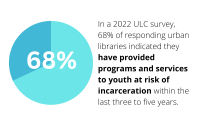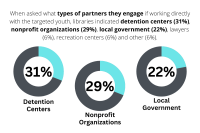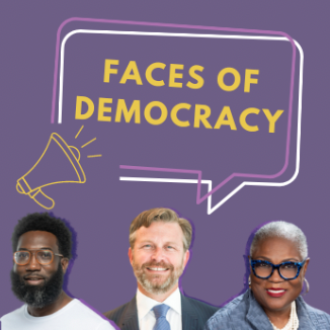Libraries Serve Youth at Risk of Incarceration

Written by Katie Sullivan, Program Manager, Urban Libraries Council
African Americans make up only 16% of the youth population in the United States, but they represent 44% of the confined youth population and are five times more likely to be incarcerated than their white peers. [1]
With varying degrees of intentionality, public libraries across the United States serve young people who are more likely to engage with the criminal justice system. With the support of the Walmart.org Center for Racial Equity, the Urban Libraries Council (ULC) is working to build a body of research around how libraries are working with African American youth, specifically focused on youth in foster care, those with incarcerated or substance-involved parents, victims of sex trafficking and youth already involved in the court system.
Libraries engage with adults reentering the community to meet their needs and help them thrive through a variety of services, from books and workforce development to digital fluency. Many libraries, however, are increasing their focus on youth before they even enter the justice system, with an eye on long-term community change.

In a 2022 ULC survey[2], 68% of responding urban libraries indicated they have provided programs and services to youth at risk of incarceration within the last three to five years. When asked if their library system has provided programs targeted toward specific groups, 38% indicated youth involved in the penal system, 15% stated youth in foster care and less than 1% indicated either children of drug-addicted parents or youth who have been involved in human trafficking.
One library already leading in this work is Columbus Metropolitan Library in Ohio, focusing on making its youth services programming inviting and inclusive to all teens.
“Many youth disengage with the library at 16 years old – it’s not necessarily the place they want to be associated with,” said Columbus Metropolitan Library Chief Executive Officer Patrick Losinski. “We are proud of the amount of work we’ve done creating dynamic facilities. We have buildings kids want to hang out in. That’s half the battle, getting them through the doors.”
Partnerships can expand the reach, scope and effectiveness of library programmatic efforts. When asked what types of partners they engage if working directly with the targeted youth, libraries indicated detention centers (31%), nonprofit organizations (29%), local government (22%), lawyers (6%), recreation centers (6%) and other (6%).

Cedar Rapids Public Library in Iowa began outreach with incarcerated youth by partnering with Fresh Start Ministries and the Linn County Juvenile Detention & Determent Services to administer their Read Woke program, which provided books and activities for incarcerated youth.
“We always talk about the more and more we can do, but the right book to the right person can change lives. And if you are incarcerated, you are probably in a position where you would like your life to change,” said Cedar Rapids Public Library Director Dara Schmidt.
This preliminary research is part of ULC’s new Creating Youth Opportunities Initiative, a program running through October 2023 in which 11 participating libraries are developing individualized and community-centered program plans to work with youth at risk of incarceration. Participating libraries are entering the program with varying levels of previous experience working with youth at risk of incarceration and face diverse challenges in their communities.
Pioneer Library System, for example, is confronting the fact that the state of Oklahoma is consistently ranked among the highest in female incarceration rates in the United States.
“One of the challenges we face will be finding the participants,” said Lisa Wells, Executive Director of the Pioneer Library System. “They’re not just going to say, ‘Hey, I’m on the path to incarceration.’ They’re working hard to ensure we don’t know that’s their situation.”
Additional findings from this initiative will continue to be shared publicly this year, and ULC hopes to support participating libraries throughout a subsequent implementation phase.
Footnotes
[1] Juvenile Detention Explained: https://www.aecf.org/blog/what-is-juvenile-detention
[2] The survey was distributed to ULC member library directors and received 47 responses.

Katie Sullivan
Program Manager, Urban Libraries Council
ULC's Creating Youth Opportunities Initiative
Creating Youth Opportunities is a ULC program to explore the role of libraries in supporting youth at risk of incarceration. Participating libraries receive the training and support they need to develop thoughtful, co-designed program plans for implementation in their own communities.
Learn More
Supported By:
Walmart.org represents the philanthropic efforts of Walmart and the Walmart Foundation. By leaning in where our business has unique strengths, we work to tackle key social issues and collaborate with others to spark long-lasting systemic change. Walmart has stores in 27 countries, employing more than 2 million associates and doing business with thousands of suppliers who, in turn, employ millions of people. Walmart.org is helping people live better by supporting programs that work to accelerate upward job mobility for frontline workers, address hunger and make healthier, more sustainably-grown food a reality, and build strong communities where Walmart operates. To learn more, visit www.walmart.org or find us on Twitter @walmart.org.
Related Articles

Guiding Public Libraries in Racial Equity to Achieve Racial Justice
In order for libraries to move forward in racial equity, people of color must be genuinely heard, received and valued. A racially equitable library will have a framework or a strategic plan with a clear mission and vision.
Learn More

Faces of Democracy: Libraries as Leaders for Civic Engagement
Across North America, public libraries are stepping up as leaders of democracy and civic engagement in their communities. In the lead-up to ULC’s 2022 Annual Forum: Creating a Place for Democracy, ULC highlighted those courageous leaders in our Faces of Democracy campaign.

